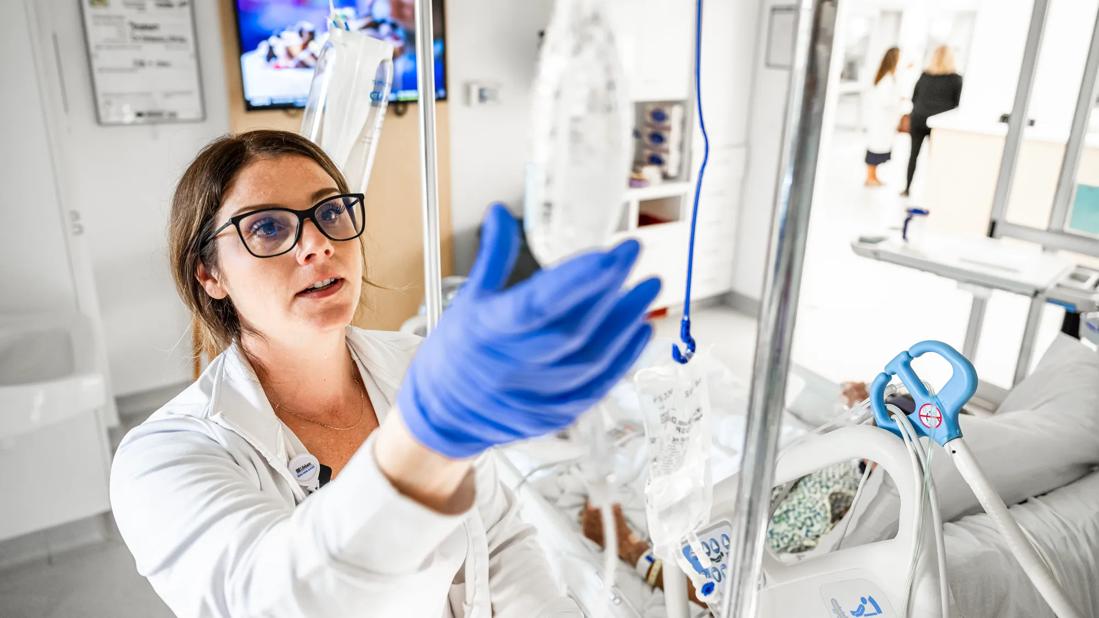Encouraging all nurses to investigate best practices

Through direct daily interaction with patients, clinical nurses regularly deal with challenges that sometimes raise questions about best practices. From the simplest to the most complex, clinical questions ignite research that ultimately can help determine the best evidence-based practices to ensure optimal patient care.
Advertisement
Cleveland Clinic is a non-profit academic medical center. Advertising on our site helps support our mission. We do not endorse non-Cleveland Clinic products or services. Policy
“By investigating clinically based questions and discussing ideas with peers, clinical nurses provide the direction for productive nursing research,” says Sandy Dankelson, BSN, RN, CNOR, an Ambulatory Surgery Center nurse at Cleveland Clinic Marymount Hospital.
She adds that support from nurse leaders and peers in an environment that values nursing research inspires clinical nurses with “a desire to learn, to investigate and to further nursing knowledge in the interest of providing the best care to each of our patients.”
Dankelson is a member of the Marymount Hospital Nursing Practice Council and a subcouncil focusing on nursing research and innovation. She is developing a proposal to investigate what patients in the ambulatory surgery setting believe “comfort” means.
Her proposed research is part of a lengthy list of research projects in various stages of completion by Cleveland Clinic nurses. In 2018, with nearly all of the health system’s hospitals participating, Cleveland Clinic nurses worked on 163 nurse-led research projects. Of those, 48 were in the beginning stages and 30 were completed in 2018.
“It is part of our culture to ask questions and search for answers. Sometimes the answers are found in a review of the literature. All too often, we learn that research evidence on a topic of interest is scarce. The quantity of research projects in motion at any one time reflects our desire to strive for high-level evidence,” says Nancy Albert, PhD, CCNS, CHFN, CCRN, NE-BC, FAAN, Associate Chief Nursing Officer of Research and Innovation. “Clinical nurses are curious and passionate about the research they initiate, and they are proud to disseminate findings and translate them into practice.”
Advertisement
Tony DiStefano, BHS, RN, CCRN, works on the Adult Medical Emergency Team at Cleveland Clinic main campus and is the principal investigator on a study. He says that when he expressed an interest in pursuing research for his team, he was “given every opportunity to attend conferences and participate in research labs and was assigned to a nurse scientist mentor.”
Research support is available to all Cleveland Clinic nurses. Besides mentoring nurses in research, nurse scientists educate, support and encourage staff during the process. Kathryn James, BSN, RN, a staff nurse who is working on an interpreter study, says that the idea of doing research used to seem daunting.
“With the help of the amazing staff here I have felt encouraged and supported every step of the way to be able to conduct the research I want to do,” James says.
In addition to a two-day research symposium, hospital-based journal clubs and individualized education to research teams, the Office of Nursing Research and Innovation hosts at least four and up to eight 4.5-hour research workshops throughout the health system each year. Topics include developing a research proposal, understanding the best way to review the literature, finding publishing opportunities for completed research, and understanding the ethics and expectations during peer reviews.
“For us to improve and dictate the future of nursing, it is vitally important to pursue research and evidence-based practice while caring for our patients,” DiStefano says. “My most important goal, beyond compassion and empathy, is to deliver safe, efficient and well-founded nursing practice.”
Advertisement
The Zielony Nursing Institute recently began offering a distance-mediated clinical research fellowship for registered nurses with a PhD who wish to advance their knowledge and skills in clinical research. Although many academic sites offer postdoctoral research fellowships, the Cleveland Clinic program is believed to be the first offered by a healthcare center that is not associated with an academic institution. The program helps researchers learn about the underpinnings of clinical research in clinical settings.
“Our goals are to help new post-doctoral nurses interested in a clinical or academic research career to increase their methodological expertise and research competencies,” says Nancy Albert, PhD, CCNS, CHFN, CCRN, NE-BC, FAAN, Associate Chief Nursing Officer of Research and Innovation. “Fellows are exposed to hospital-based research resources and our vibrant research environment. During on-site immersions, they also receive multiple opportunities to expand interdisciplinary linkages.”
Fellows have a full-time role in an academic, industry or clinical setting and receive active mentorship to advance or build a clinical research program focused on chronic or acute illness or population health. The program is learner-centric with a role-specific curriculum tailored to each fellow’s unique skill set and research development needs. Fellows are partnered with expert nurse scientists to enrich the immersive experience and support continued learning and development throughout the two-year program.
Advertisement
Advertisement

Planning continues with critical, patient-focused input from nursing teams

Strengthening care through targeted resources and frontline voices

Embracing generational differences to create strong nursing teams

CRNA careers offer challenge and reward

An unexpected health scare provides a potent reminder of what patients need most from their caregivers

Cleveland Clinic Abu Dhabi initiative reduces ICU admissions and strengthens caregiver collaboration

Veteran nurse blends compassion, cutting-edge transplant training and military tradition to elevate patient care

Embrace coaching and other tips to be a stronger leader